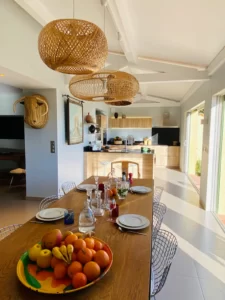Our commercial will air starting February 9, 2026 on PREMIUM RADIO Radio player!! Listen without moderation: https://premiumradio.net/
From Cannes to Nice, and as far as the Grasse hinterland, Interior Provence intervenes in premium real estate.
Founded in 2005 by a former assistant notary, the agency relies on solid expertise in wealth management and a perfect mastery of legal and financial issues.
It assists individuals and professionals in sales, exclusive searches, rehabilitation and new development programs.
Its commitments: expertise, responsiveness, confidentiality and advice.
Intérieur Provence also offers a premium eco-responsible concierge service, in partnership with local players.
Interior Provence, the real estate requirement.
More information on interieur-provence.com

Improving your living environment, bringing a rented property into compliance, carrying out development or renovation work, ensuring routine maintenance by changing lights... there is no shortage of opportunities for repairs and work! The question remains: who will pay? Follow the guide to find out who is responsible for the costs between tenants and landlords. A process that begins when you move into the property and ends with the exit inventory.
- It all starts with the inventory of fixtures upon entry
A landlord must provide decent housing in good working order to his tenant. In plain language, this means a clean dwelling, in good general condition, without risk to the health or safety of the tenant and in which all the equipment works. Normally the dwelling must be able to be inhabited immediately, the landlord having carried out the renovation work beforehand. Please note that we are not talking about refurbishment here. If during the inventory, work is required, it must be carried out by the landlord even after the tenant has moved in, unless otherwise agreed (see further in our article). The importance of the intermediary that is the real estate agent takes on its full meaning at this stage. Indeed, this professional is best placed to inform the landlord of his obligations regarding the condition of the dwelling. If he also manages the property, he will be the number one contact for the tenant facing problems with work.
Need to find a real estate agent to manage your property?
Did you know?
A landlord who rents knowing that a refrigerator does not work is at fault.
- Work to maintain the property in good condition: the tenant’s responsibility
The tenant agrees to maintain his accommodation by carrying out minor repairs, also called rental repairs. law* gives a list but it is only indicative. The decree** of August 26, 1987 specifies this list of small works but it is not exhaustive. Especially since since 1987 the equipment of the housing has improved. New elements of comfort have appeared in the housing but without instructions to define who pays for the repairs in the event of a breakdown. Consequences: conflicts and difficulties regularly clutter the courts when tenant and lessor cannot reach an agreement.
Did you know?
A repair is not in the 1987 decree? Be careful, this does not mean that it is necessarily the responsibility of the owner.
Simple and inexpensive repairs
To live well in your home, do you need to change a light bulb, a shower hose or empty the septic tank? These operations are considered normal maintenance operations for the home in which you live. By definition, they are simple to implement and inexpensive.
Doors and windows, plumbing, electricity… inventory at Prévert
It is impossible to be exhaustive on the obligations of the tenant, since even the decree of 1987 is not. In summary, the tenant must ensure:
- the proper functioning of doors and windows: maintenance, lubrication, replacement of opening mechanisms, glazing, blinds and shutters or even gate grilles,
- maintenance of ceilings, walls and interior partitions, interior floor coverings (replacement of parquet strips, connections in the event of deterioration), cupboards and woodwork,
- maintenance of switches, sockets, bulbs, fuses, light tubes and protective sheaths,
- maintenance of water and gas pipes (taps, siphons and air vents, replacement of connecting pipes, seals) but also of taps, heating and hot water. The program includes the replacement of valves, membranes, probes and other pistons but also the cleaning of limescale deposits from sanitary appliances.
Did you know?
Victim of a water leak due to the dilapidated state of the pipes? The owner comes into play because the tenant is not responsible for the dilapidated state and the work that results from it.
The boiler… and its maintenance contract
A tenant must maintain a boiler and replace a number of parts, unknown to most occupants without a plumbing diploma. Taking out a maintenance contract is the best solution to fulfill this obligation. Some landlords impose such a contract when signing the lease. To be checked.
Exterior maintenance… too
Do you have a balcony, a private garden? And you plan to be able to relax and enjoy nature? You will also have the pleasure and the obligation to mow, prune, replace shrubs but also to remove moss from your private terrace or to unclog the gutters. Does the house have a swimming pool? To enjoy this dream, you will have to clean it and change the filters…
Did you know?
The tenant does not participate in the maintenance and repair of exterior parts of which he does not have exclusive use, such as collective green spaces or the staircase.
How much is the rent for your accommodation?
- Works or transformations?
You prefer showers to bathtubs. You dream of a veranda, a fireplace. You want to create an open kitchen… So many great ideas to make your home comfortable. Except that a tenant needs written permission from the landlord to undertake renovation work. Otherwise, you will be forced to pay restoration costs when you leave. And for painting work that you can do without agreement, think neutral colors, otherwise restoration at your own expense.
Win-win agreement
Tenant and landlord can agree on works when moving in or during the lease. The tenant can carry them out in exchange for… a one-off reduction in the amount of the rent. This agreement is valid:
- if it is written when signing the lease contract or by amendment,
- if it indicates the work concerned, who is carrying it out and the compensation expected by the tenant (amount and duration of the discount granted),
- whether the accommodation met, before the work, the requirements of decency and the minimum standards of habitability and comfort.
Did you know?
If the work is not carried out as agreed, the landlord can take legal action to force the tenant to carry it out or have the agreement and the rent reduction cancelled.
The lessor on the front line
In the event of dilapidation, wear and tear, force majeure. If the tenant is responsible for maintaining the accommodation in good condition, the owner must continue to maintain it (major works) for:
- to compensate for the wear and tear of the property,
- deal with damage resulting from a case of force majeure (storm, landslide),
- correct defects and construction faults,
- replace obsolete equipment.
On the agenda: work related to structural work, aging of the accommodation, conservation of the building, replacement of obsolete appliances. Cracks in a wall, lack of waterproofing, repair of roofs and facades, replacement of doors, shutters and windows, major work on plumbing, electrical and gas systems, replacement of a boiler or water heater that is no longer in use are the responsibility of the lessor.
Did you know?
The owner is required to replace it with an identical one. Of course, he can improve the quality of the equipment provided, but nothing obliges him to do so. Victim of a burglary? The lessor will cover the cost of changing the damaged landing door. But there is no question of installing an armoured door unless the broken door was armoured.
Financial boost
Need to carry out major work in the rented or to-rent accommodation? Think MyPrimeRenov', an aid from Anah (National Housing Agency) to finance energy renovation work. It is open from July 1, 2021 to landlord owners. But there are still other aids which will be the subject of a specific article to come.
– Provided you are alerted
Infiltration, boiler that breaks down, shutter that no longer closes? The tenant must notify the owner or real estate agent, property manager as soon as possible. Telephone, emails, etc. to organize the resolution of the problem, before considering a formal notice by registered letter if the lessor does not respond.
As a reminder ?
Do not take the law into your own hands by withholding rent payments. Only a judge can reduce rent or suspend payment until the work is completed.
Notifying the owner of damage is not trivial. A tenant who forgets to do so may be ordered to pay part of the repairs if their lack of information has made the damage worse. To avoid any hassle with your tenant, call on a real estate agency.
– Compensation in the event of lengthy works
Tenant and landlord must agree on the days and times of intervention. This is rarely a problem when the repairs are urgent or when the country is in lockdown. But some interventions can cause real hassle: a building site that lasts, part of the accommodation that is difficult to access, etc. Good news: the rent must be reduced in the event of work lasting more than 40 days !
Natural deterioration of walls and floors
Did you know that a landlord is required to replace floor and wall coverings worn out by time? It is not easy to define this dilapidation. So use a "dilapidation grid" when a tenant arrives. It specifies the lifespan of the materials and equipment in a home and allows you to assess their state of deterioration. The Alur law has not created a standard dilapidation grid. The dilapidation grid must result from a collective rental agreement, established by the public housing office of a city or region.
* Law No. 89-462 of July 6, 1989, art.7 d
** Decree No. 87-712 of August 26, 1987

Our commercial will air starting February 9, 2026 on PREMIUM RADIO Radio player!! Listen without moderation: https://premiumradio.net/
From Cannes to Nice, and as far as the Grasse hinterland, Intérieur Provence handles premium real estate. Founded in 2005 by a former assistant notary, the agency relies on

Take out seasonal rental insurance or vacation insurance.
You have decided to rent out a home or your primary residence for a short period. Whether you are a tenant or owner, are you covered in the event of an accident or

Transfer rights: definition and calculation
Transfer taxes, which include registration fees and land publicity tax, are due when a property changes ownership. This transfer

Works: owner or tenant, who pays what?
Decent housing: the owner's responsibility Before any rental, the owner must ensure that the accommodation is clean and in good condition

From April 1, 2024, energy regulations change for the sale of individual houses
From April 1, 2024, the audit is required for sales of houses classified F or G by the energy performance diagnosis.

The importance of valuing your property
Carrying out a good real estate appraisal is a must during any purchase or sale of a home. What is its use? How to do it

Our commercial will air starting February 9, 2026 on PREMIUM RADIO Radio player!! Listen without moderation: https://premiumradio.net/
From Cannes to Nice, and as far as the Grasse hinterland, Intérieur Provence handles premium real estate. Founded in 2005 by a former assistant notary, the agency relies on

Take out seasonal rental insurance or vacation insurance.
You have decided to rent out a home or your primary residence for a short period. Whether you are a tenant or owner, are you covered in the event of an accident or

Transfer rights: definition and calculation
Transfer taxes, which include registration fees and land publicity tax, are due when a property changes ownership. This transfer

Works: owner or tenant, who pays what?
Decent housing: the owner's responsibility Before any rental, the owner must ensure that the accommodation is clean and in good condition

From April 1, 2024, energy regulations change for the sale of individual houses
From April 1, 2024, the audit is required for sales of houses classified F or G by the energy performance diagnosis.

The importance of valuing your property
Carrying out a good real estate appraisal is a must during any purchase or sale of a home. What is its use? How to do it
